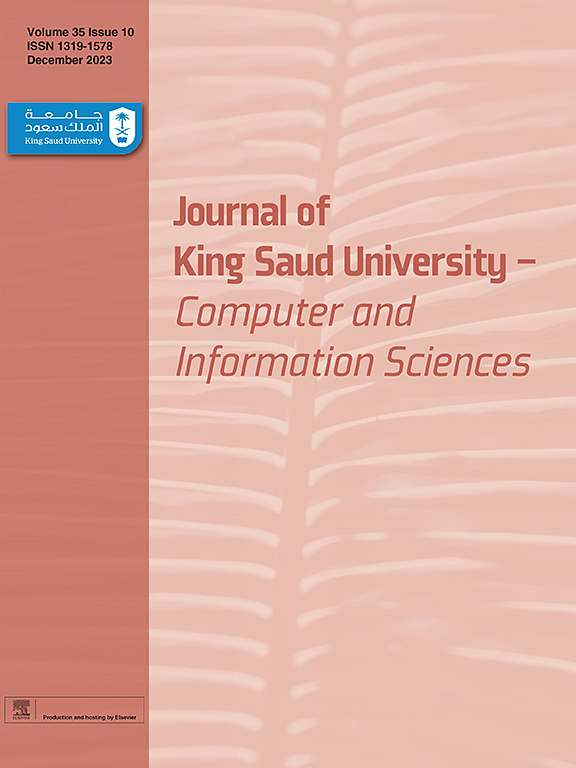Improving cache-enabled D2D communications using actor–critic networks over licensed and unlicensed spectrum
IF 6.1
2区 计算机科学
Q1 COMPUTER SCIENCE, INFORMATION SYSTEMS
Journal of King Saud University-Computer and Information Sciences
Pub Date : 2024-11-19
DOI:10.1016/j.jksuci.2024.102249
引用次数: 0
Abstract
Cache-enabled Device-to-Device (D2D) communications is an effective way to improve data sharing. User Equipment (UE)-level caching holds the potential to reduce the data traffic burden on the core network. Licensed spectrum is utilized for D2D communications, but due to spectrum scarcity, exploring unlicensed spectrum is essential to enhance network capacity. In this paper, we propose caching at the UE-level and exploit both licensed and unlicensed spectrum for optimizing throughput. First, we propose a reinforcement learning-based data caching scheme leveraging an actor–critic network to improve cache-enabled D2D communications. Besides, licensed and unlicensed spectrum are devised for D2D communications considering interference from existing cellular and Wi-Fi users. A duty cycle-based unlicensed spectrum access algorithm is employed, guaranteeing the Signal-to-Interference and Noise Ratio (SINR) required by the users. The unlicensed spectrum is prone to data packets collisions. Therefore, Request-to-Send/Clear-to-Send (RTS/CTS) mechanism is utilized in conjunction with Carrier Sense Multiple Access with Collision Avoidance (CSMA/CA) to alleviate both the interference and packets collision problems of the unlicensed spectrum. Extensive simulations are performed to analyze the performance gain of our proposed scheme compared to the benchmarks under different network scenarios. The obtained results demonstrate that our proposed scheme possesses the potential to optimize network performance.
在许可和非许可频谱上利用行为批评网络改进支持缓存的 D2D 通信
支持缓存的设备到设备(D2D)通信是改善数据共享的有效方法。用户设备(UE)级缓存有可能减轻核心网络的数据流量负担。许可频谱可用于 D2D 通信,但由于频谱稀缺,探索非许可频谱对提高网络容量至关重要。在本文中,我们提出了 UE 级缓存,并利用许可和非许可频谱优化吞吐量。首先,我们提出了一种基于强化学习的数据缓存方案,利用行为批判网络改善缓存支持的 D2D 通信。此外,考虑到现有蜂窝和 Wi-Fi 用户的干扰,我们还为 D2D 通信设计了许可和非许可频谱。采用了基于占空比的非授权频谱接入算法,保证了用户所需的信噪比(SINR)。未授权频谱容易发生数据包碰撞。因此,请求发送/清除发送(RTS/CTS)机制与带碰撞避免功能的载波侦测多路访问(CSMA/CA)相结合,可减轻非授权频谱的干扰和数据包碰撞问题。我们进行了广泛的仿真,分析了在不同网络场景下,我们提出的方案与基准方案相比的性能增益。结果表明,我们提出的方案具有优化网络性能的潜力。
本文章由计算机程序翻译,如有差异,请以英文原文为准。
求助全文
约1分钟内获得全文
求助全文
来源期刊

Journal of King Saud University-Computer and Information Sciences
COMPUTER SCIENCE, INFORMATION SYSTEMS-
CiteScore
10.50
自引率
8.70%
发文量
656
审稿时长
29 days
期刊介绍:
In 2022 the Journal of King Saud University - Computer and Information Sciences will become an author paid open access journal. Authors who submit their manuscript after October 31st 2021 will be asked to pay an Article Processing Charge (APC) after acceptance of their paper to make their work immediately, permanently, and freely accessible to all. The Journal of King Saud University Computer and Information Sciences is a refereed, international journal that covers all aspects of both foundations of computer and its practical applications.
 求助内容:
求助内容: 应助结果提醒方式:
应助结果提醒方式:


